Coffee is without doubt one of the most popular beverages in the world, and for good reason. It's delicious, invigorating, and can be enjoyed in a variety of ways. But if you're a beginner, it can be tough to know where to start.
This guide will cover all the basics of coffee, from choosing the right beans to brewing the perfect cup. We'll also discuss different types of coffee drinks, coffee equipment, and coffee culture. If you are new to drinking coffee, then this will really help you out.
Choosing the right coffee beans
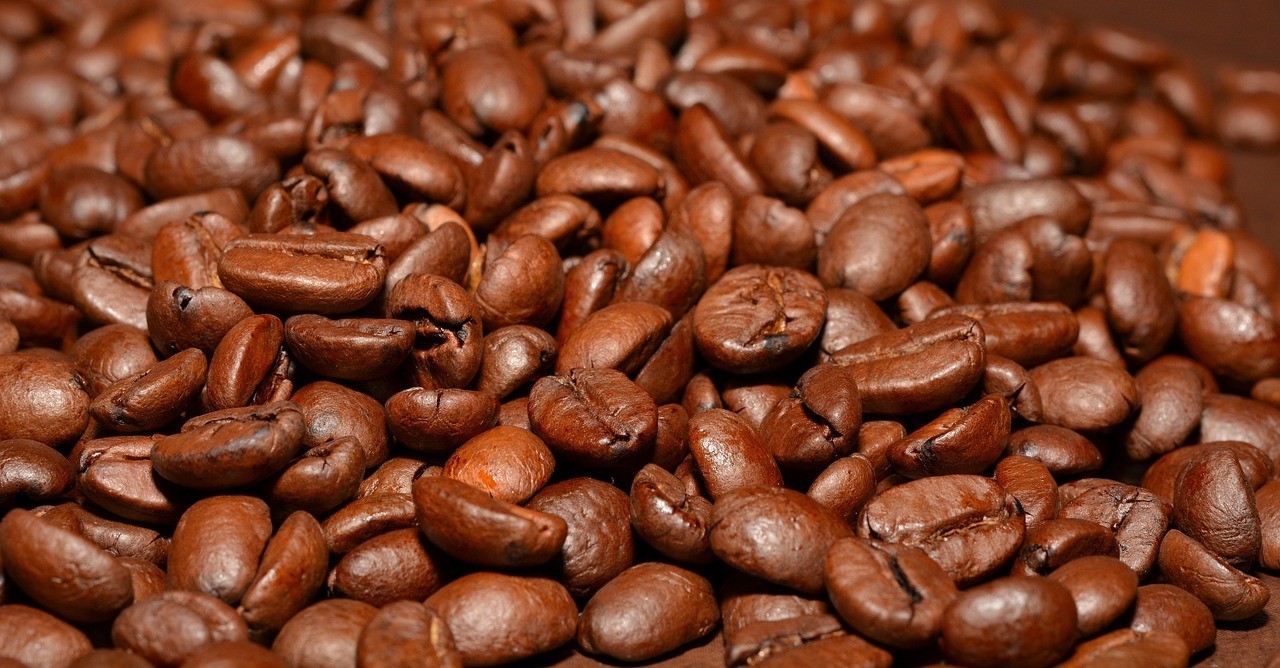
The first and most important step to making great coffee is to choose the right beans. There are two main types of coffee beans:
- Arabica
- Robusta
Arabica beans are known for their smooth, complex flavor, while Robusta beans are more bitter and have a higher caffeine content.
Most coffee blends contain a mix of Arabica and Robusta beans. When choosing a coffee, you should experiment with different blends to find one that you enjoy.
Brewing the Perfect Cup of Coffee
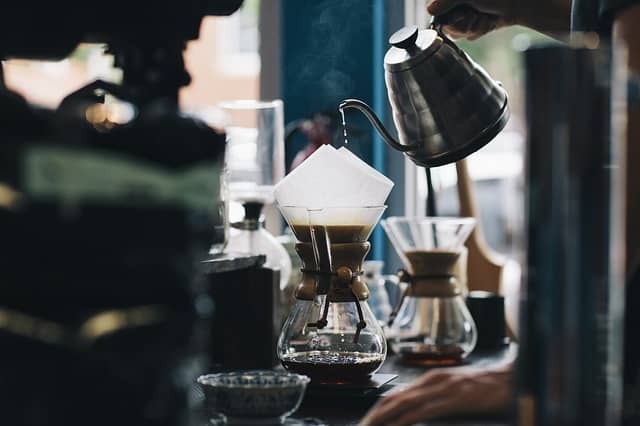
Making coffee is usually referred to as "brewing coffee" The main types of brewing coffee refer to the various ways in which coffee can be brewed, and they include:
- Drip Brewing: This is a common method, where water is dripped over ground coffee in a filter, and the brewed coffee drips into a pot or carafe below. This is also known as filter brewing.
- Espresso Brewing: Espresso is made by forcing hot water through finely ground coffee beans under high pressure. It forms the base for various coffee drinks like lattes, cappuccinos, and Americanos. This is by far the most popular brewing method in the UK.
- Immersion Brewing: In immersion methods, coffee and water are steeped together for a period before being separated. Examples include the French press and Aeropress.
- Pour-Over Brewing: Hot water is manually poured over coffee grounds, allowing it to drip through a filter and into a container. Methods like Chemex and Hario V60 fall into this category.
- Moka Pot Brewing: This stovetop device brews coffee by passing boiling water pressurized by steam through ground coffee, resulting in a concentrated coffee similar to espresso.
- Turkish Coffee: Very finely ground coffee is simmered in water with sugar and cardamom in a special pot called a cezve. It's served unfiltered and often includes grounds at the bottom of the cup. Usually has to be drunk with a glass of water
These are the main brewing types, each offering a distinct way to prepare and enjoy coffee with its own characteristics and flavors. Most people in the UK tend to use espresso and you do need to own a coffee machine to do that.
Coffee Equipment Options
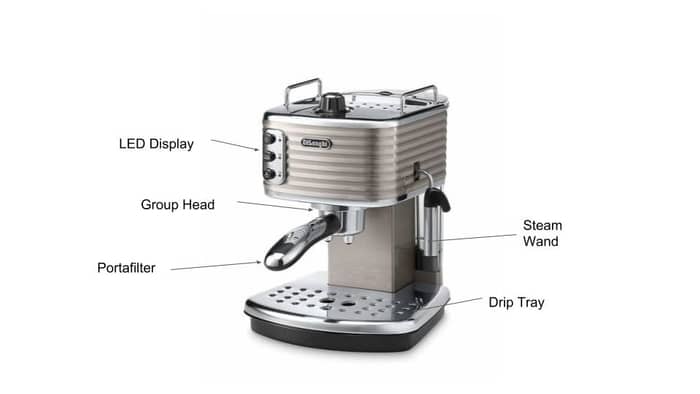
There are many ways to make coffee and we have covered these just below:
- Instant Coffee: This is not actually brewing coffee but it still remains a really popular option in the UK. You will find jars of coffee sitting on every shelf in all of the UK supermarkets. People buy this because it is fast and simple. Put a spoonful of instant coffee into a cup or mug and add hot water from the kettle and your coffee is ready to go. Add milk/sugar to your preference.
- Drip Coffee Maker: This is one of the most common methods in the USA, but not that popular in the UK. Ground coffee is placed in a paper or metal filter, and hot water is dripped over it, flowing into a pot below.
- French Press (Press Pot or Plunger Pot): Coarsely ground coffee is steeped in hot water, and then a metal or mesh plunger is used to separate the grounds from the liquid. This remains popular in the UK for coffee drinkers who like their coffee strong.
- Espresso Machine: Espresso, hugely popular in the UK and sold in every coffee shop. It is made by forcing hot water through finely ground coffee beans under high pressure. It's the base for many other coffee drinks like lattes and cappuccinos. You can also buy coffee machines for the home to make this type of espresso coffee at home.
- Aeropress: A manual method where coffee and water are mixed in a chamber and then pressed through a filter using air pressure. Popular with people who like their coffee to make and go.
- Pour-Over (e.g., Chemex, Hario V60): Hot water is poured over a paper or metal filter containing coffee grounds, allowing it to drip into a container below. The process is controlled by the person making the coffee.
- Moka Pot (Stovetop Espresso Maker): This stovetop device brews coffee by passing boiling water pressurized by steam through ground coffee. This is very popular in homes in Italy and also here in the UK.
- Cold Brew: Coffee grounds are steeped in cold water for an extended period (usually 12-24 hours) to create a smooth, low-acid coffee concentrate that can be diluted with water or milk.
- Siphon (Vacuum Pot): This method uses a two-chamber glass or metal device. Water is heated in the bottom chamber, and as it vaporizes, it moves to the top chamber where it mixes with coffee grounds. Then, as the heat source is removed, the brewed coffee is drawn back into the bottom chamber through a filter.
- Percolator: Ground coffee is placed in a metal basket, and boiling water is repeatedly cycled through the coffee until the desired strength is achieved. Tis used to be very popular in the UK, but that has dwindled. it remains popular in the USA.
- Single-Serve Coffee Makers (e.g., Keurig, Bosch, Nespresso): These machines use pre-packaged coffee pods or capsules, and hot water is forced through them to brew a single cup of coffee. These are also really popular in the UK.
As you can see there are lots of choices. Many people start their coffee journey with simple instant coffee. Espresso forms the main ingredient for the most popular coffees such as Americano, Cappuccino, Latte, Mocha etc.
Other Useful Coffee Equipment
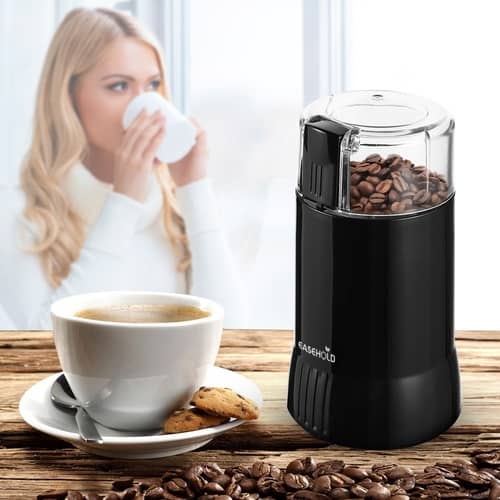
If you decide that the espresso brewing method is for you, then you will need to buy some type of coffee machine that can make espresso. There are literally hundreds of different models for doing this.
When people buy these machines, they can then pick their favourite types of beans. These come in two types:
- Pre-ground beans - these are beans that have already been ground Best Milk Frother for Coffee UK 2023and are normally packaged in airtight packaging.
- Coffee beans - you buy the coffee beans and then grind them yourself. This does ensure you get really tasty fresh coffee. If you go down that route then you may also need some of the following equipment:
- Coffee grinder - with whole beans you need to grind them. To do that you will need to buy a coffee grinder. There are two options; a burr grinder or a blade grinder. The blade grinder is the cheapest option at around £20. Burr grinders are better for extracting flavour but more expensive at around £50-£100
- Milk frother (optional) - for those who want to be able a variety of coffee drinks that require frothed milk. Some machines come with these built in, but if not, they can be bought separately. You can also buy a milk frothing jug.
- Coffee scale (optional) - this allows you to weigh out the beans
- Coffee tamper (optional) - this allows you to press the ground beans into the coffee had of a machine. Usually come with the machine.
- Coffee tamper mat - for keeping the workplace tidy.
- Knock Box - for tapping out the used coffee grains
Popular Types of Coffee Drinks
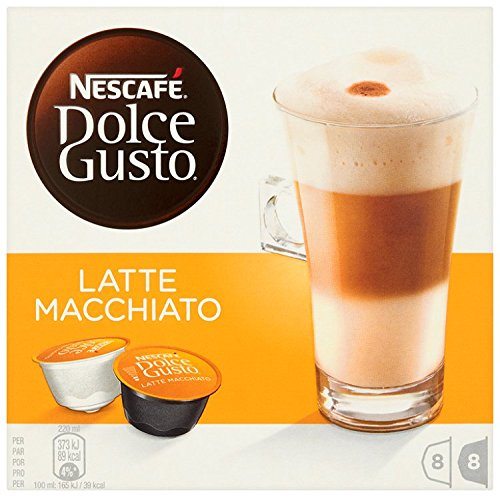
Once you've made an espresso, there are endless possibilities for what to do with it. Here are a few of the most popular coffee drinks:
- Americano: Espresso diluted with hot water.
- Latte: Espresso and steamed milk.
- Cappuccino: Espresso, steamed milk, and foamed milk.
- Mocha: Espresso, chocolate, and steamed milk.
- Macchiato: Espresso and a small amount of foamed milk.
- Cold brew: Coffee that is brewed in cold water for 12-24 hours.
You can read more about the types of coffee drinks.
Coffee Culture
Coffee is more than just a drink. It's also a culture. Coffee shops are places where people can meet, socialise, and work. Coffee festivals and competitions are held all over the world. And coffee art is a popular form of self-expression.
Coffee culture in the UK has experienced significant growth and evolution in recent years. For beginners looking to explore the world of coffee in the UK, here are some key points to keep in mind:
The UK's coffee culture has come a long way from instant coffee and tea. There is a growing interest in specialty coffee, with artisanal coffee shops and roasteries popping up across the country. This has led to a more diverse and high-quality coffee scene.
- Tea Traditions: While coffee is on the rise, the UK is still known for its strong tea-drinking tradition. Many coffee shops also offer a selection of teas, and some offer a blend of both coffee and tea experiences.
- Artisanal Coffee Shops: It is worth seeking out local, independent coffee shops to experience a wide range of coffee flavors. These places often take great care in sourcing high-quality beans, roasting them in-house, and crafting unique coffee creations.
- Specialty Coffee Events: The UK hosts various coffee-related events and competitions. These are great opportunities for beginners to learn more about coffee, such as the London Coffee Festival and the UK Barista Championships.
- Sustainability and Ethical Sourcing: Many coffee shops in the UK are committed to sustainability and ethical sourcing of coffee beans. Look for places that emphasize fair trade, organic, and environmentally friendly practices.
- Coffee Education: Some coffee shops offer coffee education sessions and tastings, which can be an excellent way for beginners to learn about different coffee beans, brewing methods, and flavor profiles.
- Mobile Apps and Loyalty Programs: Several coffee chains and independent coffee shops have their own mobile apps and loyalty programs, offering discounts and rewards for regular customers.
- Community and Social Spaces: Coffee shops in the UK often serve as community hubs, providing a welcoming and cozy atmosphere for people to meet, work, or relax.
- Diverse Food Offerings: Many coffee shops also serve a variety of food options, from pastries and sandwiches to more elaborate brunch and lunch menus, making them ideal destinations for social gatherings.
As you explore the coffee culture in the UK, don't be afraid to ask baristas for recommendations, and be open to trying different coffee styles and beans to find your personal favorites. The UK's coffee scene is a dynamic and welcoming space for coffee enthusiasts of all levels.
Coffee and Health
Coffee has been shown to have a number of health benefits, including:
- Reducing the risk of type 2 diabetes
- Improving liver function
- Protecting against Alzheimer's disease and Parkinson's disease
- Boosting mood and energy levels
However, it's important to note that coffee is also a stimulant, and it can cause anxiety and insomnia in some people. It's also important to limit your intake of sugary coffee drinks, as these can be high in calories and added sugar.
Coffee and the Environment
The coffee industry has a significant impact on the environment. Coffee is grown in developing countries, and many coffee farms use unsustainable practices such as deforestation and water pollution.
When choosing coffee, look for brands that are certified sustainable and fair trade. This will help to support coffee farmers and protect the environment.
Coffee is a complex and fascinating beverage. Whether you're a beginner or a seasoned coffee lover, there's always more to learn.
We hope this guide has given you a good overview of coffee basics. Now it's time to start experimenting and brewing the perfect cup of coffee for your taste.

